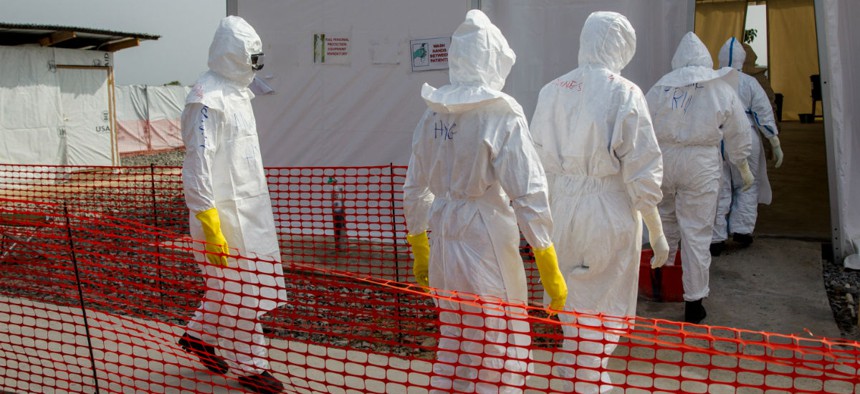
Nurses enter an Ebola treatment unit in Liberia. The facility is operated by the International Organization for Migration in partnership with Liberia's Ministry of Health and Social Welfare and supported by USAID's Office of U.S Foreign Disaster. Flickr user UNMEER
Watchdog: USAID Didn't Properly Account For $60 Million in Ebola Funds
In its emergency response, the agency took money from one set of budget accounts, but later reimbursed different ones – a congressional no-no.
The U.S. Agency for International Development mismanaged more than $60 million in funding to deal with the 2014 Ebola outbreak, according to a watchdog.
The misstep related to taking money from one set of budget accounts and reimbursing a different set of accounts with separate spending authorities with fiscal 2015 appropriations. Lawmakers must approve any requests from agencies to transfer appropriated funds to other accounts within the budget; agencies can’t move money around freely without Congress’ permission.
The Ebola outbreak in West Africa became an international health crisis during summer 2014, so USAID and the State Department used current and prior funding to provide emergency treatment for victims and respond quickly to the disaster, since Congress had not yet passed a fiscal 2015 spending bill for those agencies. Congress approved fiscal 2015 spending in December that year for those agencies, providing $2.5 billion to USAID and State to prevent, prepare and respond to the Ebola outbreak. Because of the timing of the crisis and the appropriations schedule, the two agencies had to replace the budget coffers, reimbursing the program and office accounts they took money from to deal with the emergency using fiscal 2015 funds.
USAID made 21 reimbursements totaling more than $60 million to budget accounts that “it did not have the legal authority to make, possibly resulting in the obligation or expenditure of funds in excess of appropriations,” the Government Accountability Office report said, calling the reimbursements “unauthorized transfers.” That would be a violation of the Antideficiency Act.
“While most of USAID’s reimbursements were made in accordance with the reimbursement provisions of the Act, roughly 15 percent of the funds that USAID reimbursed were not,” GAO concluded. “In particular, USAID did not in all cases reimburse the same appropriation accounts from which it obligated funds as required by the Act, and in several instances it made reimbursements for obligations for which it did not document that it incurred the obligation to prevent, prepare for, and respond to the Ebola outbreak.”
USAID coordinated federal efforts to the Ebola outbreak, working with several departments, including State, Defense, and the Centers for Disease Control and Prevention, in what most view as a successful mission.
The agency correctly made 271 reimbursements for obligations incurred before the fiscal 2015 appropriations bill was enacted, totaling $401 million. As of July 1, 2016, nearly $1.5 billion had been obligated by USAID, which is still helping countries and individuals affected by the largest Ebola outbreak in history. As of June 2016, there were 11,310 deaths in Guinea, Liberia, and Sierra Leone from Ebola since the 2014 outbreak, according to the World Health Organization.
GAO also dinged USAID for reimbursing obligations for Ebola activities without documentation. “In reviewing the reimbursements, GAO found that USAID does not have written policies or procedures for staff to follow in making and documenting reimbursements,” the report said.
The watchdog recommended that USAID “reverse” the improper reimbursements, and develop written policies for documentation, which the agency agreed with. In its response, USAID said that officials “took urgent steps” to respond quickly to the crisis. “In the several instances cited by GAO, USAID gave verbal technical instructions to implementing partners authorizing changes in scopes of work to respond to the immediate crisis, and these changes were not documented in writing … USAID will reverse all reimbursements that were not reimbursed to the same appropriation account from which USAID obligated the funds, including these reimbursements where the documentation was lacking.”
NEXT STORY: How to Cure Your Post-Election Stress







